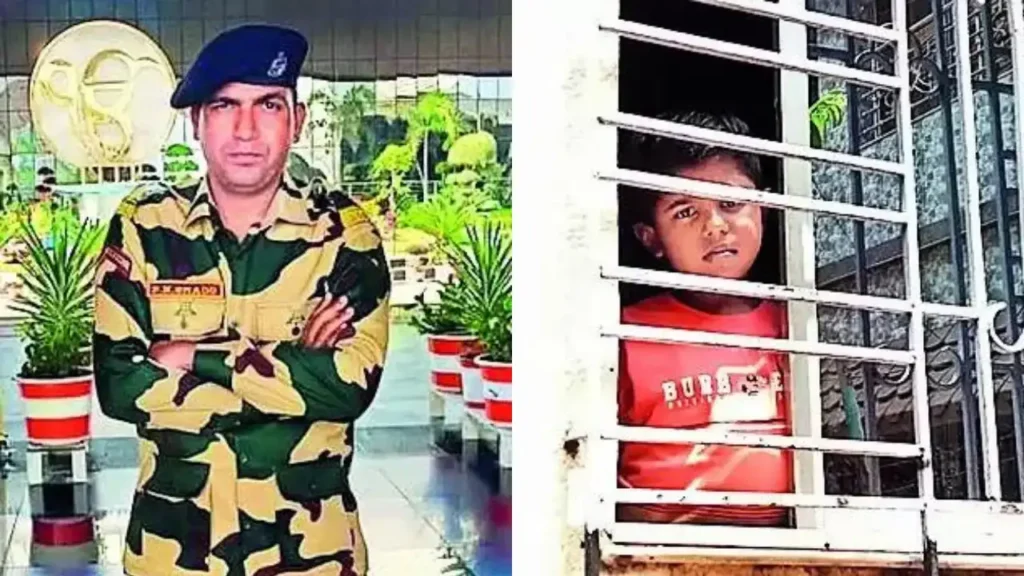BSF Soldier Detained by Pakistan on April 23 Returns to India After Nearly Three Weeks
Wagah Border, May 14 — BSF constable Purnam Kumar Shaw returned to India on Tuesday after spending nearly three weeks in Pakistani custody. He had crossed the international border by mistake on April 23 while patrolling near Punjab’s Firozpur sector.

Officials from both sides coordinated his handover at the Wagah-Attari border, concluding a tense period of uncertainty for his family and the Border Security Force.
How It Happened
Shaw, deployed in the Firozpur sector, accidentally entered Pakistani territory during a routine patrol. Such incidents occasionally occur along stretches of the India-Pakistan border where terrain and visibility can cause confusion.
As soon as BSF officers realized he had crossed over, they contacted Pakistan Rangers and requested a flag meeting. However, Pakistani authorities initially avoided engaging in any discussion, which delayed the soldier’s return.
Family’s Fight for Help
Back home in West Bengal, Shaw’s wife, Rajani, launched an emotional campaign to bring him back. She reached out to West Bengal Chief Minister Mamata Banerjee, who promised support. “We will stand with our soldiers and their families,” Banerjee assured her.
Her appeal triggered national attention. Social media users, defense veterans, and politicians voiced their support and demanded Shaw’s safe return. As the days passed without any progress, public pressure on the government increased.
Heightened Tensions Between the Countries
Shaw’s detention came just a day after a terror attack in Pahalgam, Jammu & Kashmir, which worsened diplomatic ties between India and Pakistan. The rising tension made both sides cautious, and Pakistan’s unwillingness to initiate a flag meeting added to the delay.
Indian officials continued pressing for Shaw’s release through military and diplomatic channels but found little cooperation from across the border during the initial phase.
India Gains Leverage
The situation began to shift on May 3, when BSF personnel apprehended a Pakistani Ranger who had illegally entered Indian territory near Sri Ganganagar, Rajasthan. This unexpected event gave Indian negotiators more leverage.
Though neither side officially confirmed a link between both incidents, the timing of Shaw’s release strongly suggested that the captured Pakistani soldier influenced Pakistan’s decision to cooperate.
After internal deliberations and pressure, Pakistani authorities agreed to return Shaw.
The Return
On May 14, Indian officials received Shaw at the Wagah border. Medical teams examined him and reported that he was healthy and physically stable. BSF officers welcomed him and praised his composure during the ordeal.
A BSF spokesperson said, “We are proud of our jawan’s courage and thankful for the coordinated efforts that ensured his return. His well-being remained our top concern throughout.”
Shaw’s wife, Rajani, expressed immense relief. “I feel like I can finally breathe again. I can’t thank everyone enough for supporting us,” she said as she prepared to reunite with him.
Key Lessons
Shaw’s ordeal shows how unpredictable and risky border duties can be. It also highlights the importance of direct and prompt communication between forces on both sides to resolve such matters quickly.
Improving border demarcation, using better surveillance tools, and training personnel on navigating disputed areas can reduce such incidents in the future. Humanitarian issues like accidental crossings should remain separate from political disputes to avoid unnecessary escalations.
A Hopeful Ending
Constable Shaw’s return offers a rare example of successful coordination between India and Pakistan amid ongoing tension. While larger geopolitical challenges persist, this case reminds us that humanitarian efforts and mutual understanding can still prevail.
For Shaw, his family, and the BSF, this marks the end of a difficult chapter. For soldiers serving along sensitive borders, it reinforces the reality of their daily risks—and the unwavering support they receive from those they protect.






